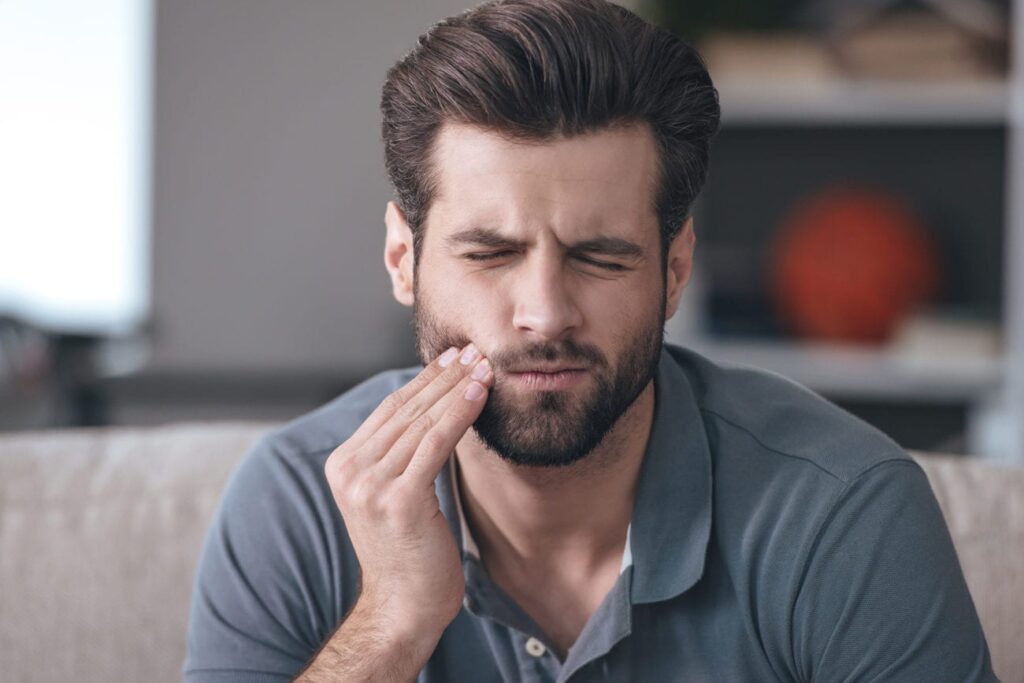Advanced Dental Care For Teeth Grinding in Morristown, NJ
Are your teeth worn down due to teeth grinding? Address the root cause and fix the appearance of worn teeth all in one location.
Repeated trauma to your teeth can affect their health, function, and appearance. Teeth grinding, also known as bruxism, occurs when the biting surfaces of the teeth come together. The repeated pressure and trauma to your teeth can cause tooth wear, breakage, and tooth sensitivity.
At Morristown Cosmetic Dentistry near you, Dr. Victor Gittleman can assess your teeth and determine if you have experienced tooth grinding. Our goal is to prevent further grinding, correct any damage that your teeth and jaw have suffered, and reduce the risk of future grinding. Teeth clenching is also related to grinding and can be addressed in the same way. Teeth clenching and grinding are just one of the common dental concerns Dr. Gittleman treats at his Morristown, NJ, office.

What Causes Tooth Grinding?
It is natural to grind your teeth to some extent. However, when tooth grinding is done frequently, it can cause damage to your teeth and lead to pain or discomfort in the face, neck, and jaw.
Before any treatment is recommended, it is important to understand the underlying cause of tooth grinding. Some potential causes of tooth grinding might include:
- Crooked or misaligned teeth
- Missing teeth
- Misaligned bite or abnormal bite
- Daily stress and anxiety
- Certain types of medication
Symptoms of Teeth Grinding
Teeth grinding typically occurs unconsciously during sleep. Many patients don’t realize they grind their teeth until someone else tells them or they visit their dentist.
Symptoms of teeth grinding may include:
- Chronic headaches, especially in the morning
- Pain, tightness, or discomfort in the jaw or face
- Earache
- Worn or damaged teeth
In advanced cases, teeth grinding can lead to dysfunction in the TMJ (temporomandibular joint). When left untreated, TMJ disorder can compromise the function and balance of your bite and lead cause uncomfortable symptoms. Finding a solution for teeth grinding is key to restoring health to your smile.
Treatment For Teeth Grinding
For patients dealing with signs of teeth grinding, Dr. Gittleman can Examine your teeth and jaw for any signs of dysfunction. In many cases, we can work with patients to alleviate their symptoms and repair damage to their teeth and jaw.
Treatment options depend on the unique needs of the patients as well as the underlying cause of tooth grinding. After a completed dental examination, Dr. Gittleman may recommend one or more of the following treatments for teeth grinding:
- Dental splint therapy
- Orthodontics
- Dental Crowns
- Dental bonding
- Custom mouthguard
Teeth Grinding FAQs
How do I know if I’m grinding my teeth at night?
Do you wake up with a mild headache sometimes or every morning? Does your jaw feel weird or hurt when you wake up in the morning? Chances are that you suffer from some level of nighttime bruxism. The most apparent sign of teeth grinding is worn down teeth and missing enamel.
How much damage can tooth grinding cause?
Teeth grinding can cause noticeable damage to your teeth, jaw, and gums. Your tooth enamel is worn down, your teeth can become chipped, and you can develop permanent tooth sensitivity. Leaving teeth-grinding issues unaddressed can cause irreversible symptoms such as tooth loss.
Is teeth grinding linked to Obstructive Sleep Apnea?
In certain cases, Obstructive Sleep Apnea can be the cause of teeth grinding at night. There are many symptoms associated with sleep apnea. By addressing the root cause, teeth grinding can be managed and stopped. Consult with our dentist near you to help you find the root cause of your teeth grinding.
Contact Morristown Cosmetic Dentistry Today
With over three decades of experience, Dr. Victor Gittleman has seen his fair share of dental issues. He takes a comprehensive approach to your dental care to ensure you get the diagnosis and treatment you need to improve your dental health.
If you are experiencing any signs of tooth grinding or have not visited the dentist recently, visit our Morristown, NJ dentist office for routine screening. We offer a full range of treatment options for patients who grind or clench their teeth. To schedule an appointment, call (973) 287-3337 or request an appointment online.
